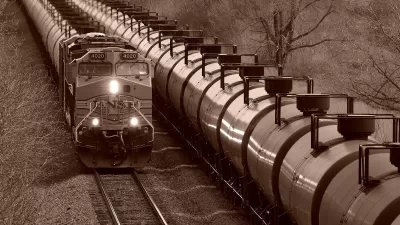The Biden administration's highly anticipated infrastructure spending plan is expected to go public this week. After weeks of speculation about the size and focus of the plan, recent reports reveal a growing package and new revenue streams.

An article by Jim Tankersley in The New York Times last week reported that the Biden administration was in the process of crafting a $3 trillion spending package. Fast forward a week and Jeff Stein is reporting for The Washington Post that the expected price tag for the Biden infrastructure plan could reach as high as $4 trillion.
Stein's update of the unfolding story includes some background on the economic concerns driving the back and forth of the internal debate in the Biden administration about how to create the revenue to support the massive spending plan.
"The choice to limit the impact on the federal deficit may help the White House counter critics who say that the nation’s spending imbalance is out of control. But it also sets up the administration for an enormous political challenge in convincing Congress to pass a package of tax increases on wealthy Americans and companies that together would represent the largest tax hike in generations," writes Stein.
Another article, written by Ella Nielsen, takes the Vox "explainer" post approach, focusing on Biden's "Build Back Better" campaign message and the climate change investments included in the expected infrastructure spending plan.
Nielsen writes:
Those close to the Biden White House underscore this is a key part of the president’s agenda, and his goal of steering America’s economy toward clean energy and manufacturing. Biden and Democrats see an infrastructure package as the best way to tackle climate change and get the country to net-zero electricity emissions by 2035, by installing more electric vehicle charging stations on the nation’s roads, modernizing the electrical grid, and incentivizing more wind and solar projects. It could be financed at least in part with higher taxes on corporations and the wealthiest Americans.
Nielsen also shares a useful rundown of the other infrastructure bills already proposed in Congress—some of which could be incorporated into the Biden administration package.
Advocates are also gearing up for messaging and lobbying efforts in anticipation of the bill. Transportation for America, for example, published an article by Beth Osborne detailing how the Biden administration must break with the status quo of infrastructure spending if this effort is to reverse some of the damage of planning history, and anticipate and prevent the consequences of continued neglect of issues like climate change, air pollution, congestion, and systemic inequality.
There are lessons to be learned from the relatively recent past, writes Osborne:
We’ve been here before: the 2009 Recovery Act put a lot of money into existing federal transportation programs—rather than targeting the funding for a specific purpose —in order to move money quickly. But these programs weren’t designed to solve the issue at hand: short-term job creation. So they failed to create the most new jobs as they could have.
Dion Rabouin, in an article for Axios, shares that economists are "bullish" about earlier reports of the Biden infrastructure package: "Economists are becoming positively giddy about the potential for economic growth this year as President Biden and Congressional Democrats look set to push forward a $3 trillion infrastructure bill." Experts from S&P Global, Goldman Sachs, and Duke University are cited as evidence of the positive response from this sector.
Meanwhile, the Congressional Progressive Caucus is continuing to push for an even large package called the THRIVE Act, which would spend $10 trillion over the next decade, "including massive investments in renewable energy, zero-emissions buildings and economic development in some of the worst-polluted parts of the country," according to an article by Alexander C. Kaufman for the Huffington Post.
Despite this support from advocates and the traditional perception of infrastructure as a relatively bipartisan issue, whatever package emerges this week will face heated debate about deficit spending and the federal government's role in fighting climate change. According to the article by Ella Nielsen cited above, the Biden infrastructure plan could take all year to pass, if it passes at all.

Alabama: Trump Terminates Settlements for Black Communities Harmed By Raw Sewage
Trump deemed the landmark civil rights agreement “illegal DEI and environmental justice policy.”

Study: Maui’s Plan to Convert Vacation Rentals to Long-Term Housing Could Cause Nearly $1 Billion Economic Loss
The plan would reduce visitor accommodation by 25% resulting in 1,900 jobs lost.

Planetizen Federal Action Tracker
A weekly monitor of how Trump’s orders and actions are impacting planners and planning in America.

Baltimore Ordered to Improve Sidewalk Accessibility
The city is one of many to face lawsuits for failing to comply with the Americans with Disabilities Act.

This Toronto Suburb Has More Bus Riders Than Columbus, Ohio
Brampton, Ontario used gradual improvements in service to prove that if you build it, they will ride.

Paris Bike Boom Leads to Steep Drop in Air Pollution
The French city’s air quality has improved dramatically in the past 20 years, coinciding with a growth in cycling.
Urban Design for Planners 1: Software Tools
This six-course series explores essential urban design concepts using open source software and equips planners with the tools they need to participate fully in the urban design process.
Planning for Universal Design
Learn the tools for implementing Universal Design in planning regulations.
Smith Gee Studio
Alamo Area Metropolitan Planning Organization
City of Santa Clarita
Institute for Housing and Urban Development Studies (IHS)
City of Grandview
Harvard GSD Executive Education
Toledo-Lucas County Plan Commissions
Salt Lake City
NYU Wagner Graduate School of Public Service






























